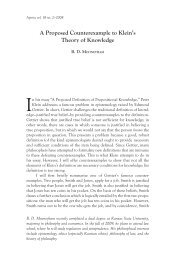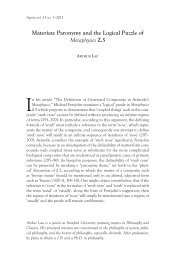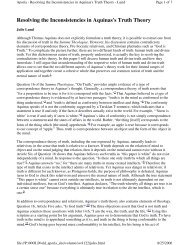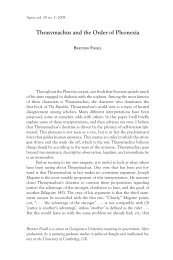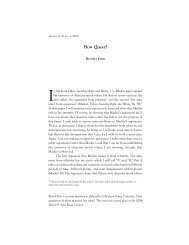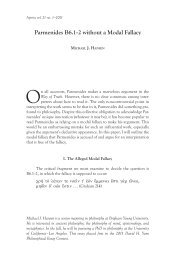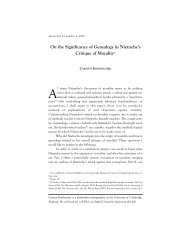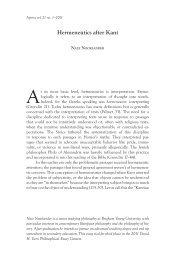Aristotle's A Priori Metaphor - Aporia - Brigham Young University
Aristotle's A Priori Metaphor - Aporia - Brigham Young University
Aristotle's A Priori Metaphor - Aporia - Brigham Young University
You also want an ePaper? Increase the reach of your titles
YUMPU automatically turns print PDFs into web optimized ePapers that Google loves.
Aristotle’s A <strong>Priori</strong> <strong>Metaphor</strong> 29<br />
we all naturally find it agreeable to get ahold of new<br />
ideas easily: words express ideas, and therefore those<br />
words are the most agreeable that enable us to get ahold<br />
of new ideas. Now strange words simply puzzle us; ordinary<br />
words convey only what we know already; it is from<br />
metaphor that we can best get ahold of something fresh.<br />
(Rhetoric 1410b 10-15 emphasis added)<br />
Since metaphor most effectively brings truths into view, it is the basis for<br />
definition. In other words, for something to be defined by the rational<br />
dialectical process, it must have already been grasped by the process. <strong>Metaphor</strong><br />
makes that possible by originally bringing the phenomenon into<br />
view. Nevertheless, metaphor does not undermine definition, but rather<br />
is a supportive basis for it. Hesse understands this and describes how, in<br />
a similar fashion, metaphor is a natural extension of a rational process.<br />
She explains how “rationality consists just in the continuous adaptation of<br />
our language to our continually expanding world, and metaphor is one of<br />
the chief means by which this is accomplished” (177). In other words, the<br />
creative force of metaphor brings us meaning when our knowledge of the<br />
world is expanding. Marcos describes how dialectical<br />
processes all require the use of a projective imagination<br />
based on our structured experience” which combine<br />
with heuristic understanding to “bring us meaning in a<br />
direct way. (129)<br />
<strong>Metaphor</strong> generates meaning directly because it gathers the scientific phenomenon<br />
originally into view. Once metaphor has brought truths into<br />
view, the dialectic is able to define them. This is likely what Aristotle had<br />
in mind when he wrote that metaphor “is the one thing that cannot be<br />
learnt from others” (Poetics 1459a 8). It “cannot be learned because it is the<br />
underlying condition of all learning” (Davis 128).<br />
Because it underlies the procedures upon which scientific knowledge<br />
is based, metaphor is a foundational necessity for essential knowledge. The<br />
scientific point of view that such essential knowledge can be reached only<br />
by dialectical reasoning is thus flawed. It is likewise mistaken if it assumes<br />
that Aristotle originated this perspective. Rather, Aristotle recognized the<br />
disclosive role of metaphor, and he clarified his position through his usage.<br />
He makes this practical clue explicit in his Rhetoric where he suggests<br />
that metaphor is valuable as more than a rhetorical or literary device. His<br />
emphasis on the proper application of the trope thus affirms metaphor’s<br />
ability to initiate fundamental disclosure. Therefore metaphor, traditionally<br />
seen only as a rhetorical or poetic device, has far more of a role in



